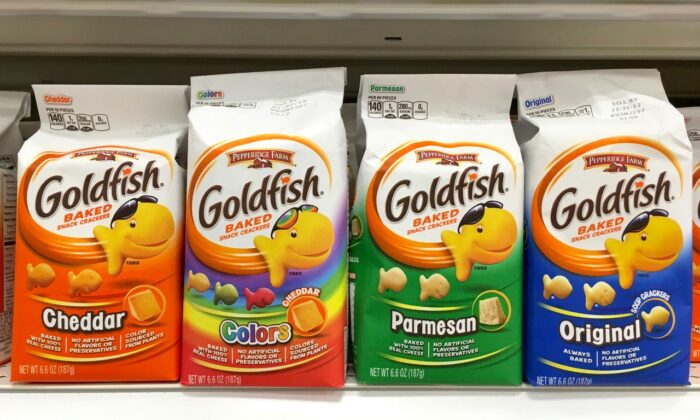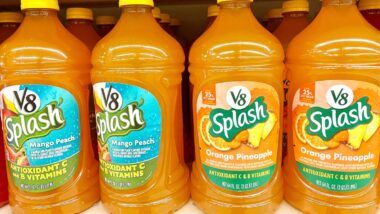Top Class Actions’s website and social media posts use affiliate links. If you make a purchase using such links, we may receive a commission, but it will not result in any additional charges to you. Please review our Affiliate Link Disclosure for more information.

Goldfish Crackers Class Action Overview:
- Who: A pair of consumers that purchased Goldfish crackers labeled as containing “0g Sugars” have filed a nationwide class action lawsuit against snack makers Pepperidge Farm and Campbell Soup Co.
- Why: Goldfish crackers are not a low-calorie food and contain sugar — the “0g Sugars” claim allegedly misleads consumers.
- Where: The complaint was originally lodged in California state court, but was transferred to federal court Tuesday.
The “snack that smiles back” may not be as healthy as consumers think, according to a class action lawsuit that accuses Pepperidge Farm and Campbell Soup Co of misleading consumers about the calorie and sugar content of Goldfish crackers.
Lead plaintiffs, Denise Cleveland and Lanna Rainwater, want to represent a nationwide Class of consumers who purchased Goldfish crackers, according to their complaint transferred to California federal court Tuesday. They say that Goldfish cracker manufacturer, Pepperidge Farm and parent company Campbell Soup, misled consumers into thinking the snacks are low in calories.
“Even worse,” states the class action, “the Goldfish actually contain sugar.”
Goldfish Crackers’ ‘0g Sugar’ Label Misleads Consumers
Cleveland and Rainwater both say they purchased multiple varieties of Goldfish crackers for their families. They say that the product’s labeling led them to believe they were purchasing a low-calorie, low-sugar snack; however, Goldfish crackers are neither, say the plaintiffs.
Indeed, both consumers say that they would not have purchased or paid as much for the Goldfish crackers had they not been misled by the “0g Sugars” claims on the products’ packaging.
“Despite the Goldfish being labeled as having ‘0g Sugars’ and not being low calorie or significantly reduced in calories, Defendants fail to include the prominent warning that the Goldfish are not low or reduced calorie foods, or not for weight control, prominently accompanying the ‘0g Sugars’ claim,” alleges the class action lawsuit.
Further, Goldfish crackers contain sugar, despite being prominently labeled as containing “0g Sugars,” contend the plaintiffs. The popular “Cheddar” flavor of Goldfish includes both sugar and dextrose on its ingredients list, points out the class action lawsuit.
In addition, all types of Goldfish crackers are made with wheat flour — a substance that naturally contains sugar, say the plaintiffs.
Pepperidge Farm and Campbell Soup misled health-conscious consumers by falsely advertising Goldfish crackers, alleges the class action lawsuit.
Cleveland and Rainwater want to represent consumers across the US who purchased any of the following varieties of Goldfish crackers:
- Organic, Regular, Colors, and Baby Cheddar Goldfish
- Organic Original Goldfish
- Organic and Regular Parmesan Goldfish
- Flavor Blasted Xplosive Pizza Goldfish
- Mix Cheesy Pizza + Parmesan Goldfish
- Whole Grain XTRA Cheddar Goldfish
- Disney Mickey Mouse Goldfish
- Whole Grain Colors Cheddar Goldfish
- Flavor Blasted XTRA Cheddar Goldfish
The plaintiffs are seeking damages on behalf of Class Members, along with a court order forcing Pepperidge Farm and Campbell Soup to properly label Goldfish crackers.
This is not the first time consumers have allegedly been duped about the nutrition content of Goldfish crackers. In 2012, A Colorado resident lodged a $5 million class action lawsuit alleging Pepperidge Farm labeled its Cheddar Goldfish crackers as “natural,” even though they contain genetically modified soybean oil. Pepperidge Farm is also facing a class action claiming it doesn’t put as much butter in its Golden Butter Crackers as customers expect.
Have you purchased Goldfish crackers? Are you concerned about the calories or sugar content of the snack? Tell us about it in the comment section below!
The plaintiffs are represented by Wyatt A. Lison and Joseph N. Kravec, Jr. Of Feinstein Doyle Payne & Kravec, LLC, and Deniel L. Warshaw and Melissa S. Weiner of Pearson, Simon & Warshaw, LLP.
The Goldfish Crackers Class Action Lawsuit is Cleveland, et al. v. Campbell Soup Company, et al., Case No. 4:21-cv-06002 or 3:21-cv-06002 in the U.S. District Court for the Northern District of California
Don’t Miss Out!
Check out our list of Class Action Lawsuits and Class Action Settlements you may qualify to join!
Read About More Class Action Lawsuits & Class Action Settlements:
- Chicken Farmers Reach Settlement With Perdue Farms for Alleged Price Fixing
- More Than 147 Tons of Raw Beef Recalled for ‘Potentially Deadly’ E. coli Contamination
- Recall Check: Baby Carrots Recalled Over Risk of Salmonella Contamination
- Subway Tuna Fish Sandwich Lawsuit ‘Outrageous,’ Says Co in Bid To Dismiss Class Action















1,306 thoughts onGoldfish Crackers Contain Sugar Despite ‘0g Sugars’ Claim, Alleges Class Action Lawsuit
Purchased many times and I am shocked about this lawsuit for Gold Fish Crackers!
Pls add me
Oh wow!! Pls,add me.